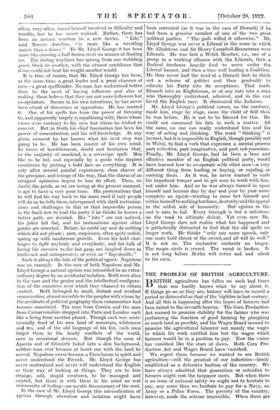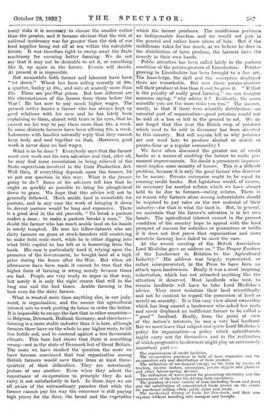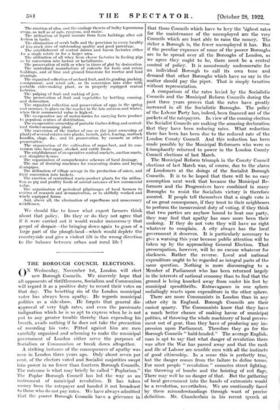THE PROBLEM OF BRITISH AGRICULTURE. B RITISH agriculture has fallen on
such bad times that one hardly knows what to say about it. If things go on as they are, history will have to record a period as distressful as that of the 'eighties in last century. And all this is happening after the hopes of farmers had been raised to the seventh heaven. The Corn Production Act seemed to promise stability for the farmer who was performing the function of good farming by ploughing as much land as possible, and the Wages Board seemed to promise the agricultural labourer not merely the wages to which his work entitled him but the wages which farmers would be in a position to pay. Now the vision has vanished like the stars at dawn. Both Corn Pro- duction Act and Wages Board have vanished.
We regret them because we wanted to see British agriculture—still the greatest of our industries—firmly established as a defensive bastion of the country. We have always admitted that guarantees or subsidies to farmers might cost the taxpayer more. But when -there is an issue of national safety we ought not to 'hesitate to pay, any more than we hesitate to pay for a Navy, an Army or a Police Force. 'The poverty of the country, however, made the scheme impossible. When there are many risks it• is necessary to choose the smaller rather than the greater, and it became obvious that the risk of national insolvency was far greater than the risk of our food supplies being cut off at sea within the calculable future. It was therefore right to sweep away the State machinery for ensuring better farming. We do not say that. it may not be desirable to set it, or something like it, up again in the future. Events will decide. At present it is impossible.
But meanwhile both farmer and labourer have been " let down." Wheat has been selling recently at 89s. a quarter, barley at 38s., and oats at scarcely more than 25s. These are pre-War prices. But how different are the circumstances of the farmer from those before the War 1 He has now to pay much higher wages. The present writer knows a farmer who has always kept up good relations with his men and he has lately been explaining to them, almost with tears in his eyes, that he cannot see his way to pay them more than 28s. a week. In some districts farmers have been offering 25s. a week. Labourers with families naturally reply that they cannot keep body and soul together on that. Moreover, good work is never done on bad wages.
What is to be done ? Everybody says that the farmer must now work out his own salvation and that, after all, he may find some consolation in being relieved of the State supervision involved in the Corn Production Act. Well then, if everything depends upon the farmer, let us put our question in this way. What is the farmer going to do ? Some of his advisers tell him that he ought as quickly as possible to bring his plough-land down to grass. We hope that this advice will not be generally followed. Much arable land is unsuitable for pasture, and in any case the work of bringing it down to decent pasture would be long and expensive. There is a- good deal in the old. proverb, " To break a pasture makes a man ; to make a pasture breaks a man." No doubt the farmer who has- much arable land on his hands is sorely tempted. Ile sees his fellow-farmers who are dairy farmers on grass or stock-breeders still' contriving to make both ends meet, while he is either digging into what little capital he has left or is borrowing from the bank. His case is particularly hard if, relying upon the promises of the Government, he bought land at a high price during the boom after the War. But when all allowances have been made it cannot be true that the higher form of farming, is wrong merely because times are bad. People are very ready, to argue in that way, but surely it is only the right course that will in the long run end the bad times. Arable farming is' the best even for the dairy farmer.
What is wanted more than. anything else, in our judg- ment, is organization, and the sooner the agricultural interest sets to work putting its house in order the better. It is impossible to escape the fact that in other countries— in Belgium, Denmark, Holland, Germany, and elsewhere— farming is a more stable industry than it is here, although farmers there have on the whole to pay higher rents, to till less fertile soil, and to contend against a less favourable climate. This bare fact shows that there is something wrong—not in the state of Denmark but of Great Britain. The more we have studied the question the more we have- become convinced that real organization among British farmers would save them from at least three- quarters of their difficulties. They are notoriously jealous of one another. Even when they admit the importance of co-operation in principle they do not carry it• out satisfactorily in fact. In these days we are all aware of the extraordinary paradox that while the farmer cannot pay his way the consumer is still paying high prices for the flour, the bread and the vegetables which the farmer produces. The middleman performs an indispensable function and we would not join in the general and rather loose abuse of him. But if the middleman takes far too much, as we believe he does in the distribution of farm produce, the farmers have the remedy in their own hands.
Public attention has been called lately to the parlous condition of the potato-growers of Lincolnshire. Potato- growing -in Lincolnshire has been brought to a fine art. The knowledge, the skill and the enterprise displayed there are remarkable. But now those potato-growers sell their produce at less than it cost to grow it. " If that is the penalty of really good farming," we can imagine someone saying, " why advise it ? Evidently, the more scientific you are the more risks you run." The answer, surely, is that if there were scientific distribution—an essential part of organization—good potatoes would not be sold at a loss or left in the ground to rot. We do not forget that this year the Dutch crop of potatoes which used to be sold in Germany has- been diverted to this country. But will anyone tell us why potatoes are not used here to produce alcohol or starch or potato-flour as a regular commodity ?
We have often discussed the greater use of credit banks as a means of enabling the farmer to make per- manent improvements. No doubt a permanent improve- ment implies some security of tenure. This is a difficult problem, because it is only the good farmer who deserves to be secure. Private enterprise ought to- be equal to running credit banks. But legiSlation would, of course, be necessary for another reform which we have always held to be due to farmers—rating. reform. There is no reason why farmers alone among industrialists should be required to pay rates on the raw material of their industry—for that is what the land is. But, in general, we maintain that the farmer's salvation is in his own hands. The agricultural' interest cannot. in the present condition of the country hope to appeal with the least prospect of success for subsidies or guarantees or tariffs if it does not first prove that organization and more scientific farming have failed to meet the case.
At the recent meeting of the. British. Association Lord Bledisloe gave an address on " The Proper Position of the Landowner in Relation to - the Agricultural Industry." His address was largely represented, or rather misrepresented, in the Press to have been an attack upon. landowners. Really it. was a most inspiring exhortation, which has not attracted anything like the attention it deserved. Most landlords who wish to remain landlords will have to take Lord. Bledisloe's advice. They must maintain their land. scientifically and not be content to regard the possession of land as merely an amenity. It is this easy view about ownership which has long caused a landowner who asked low rents and never displaced an indifferent farmer to be called a " good " landlord. Really, from the point of view of the nation's interests, he was a very bad landlord. But we must leave that subject and quote Lord Bledisloc's policy for organization—a policy which agriculturists might carry out for themselves and in the realization of which progressive landowners might play an enormously important part :— The organization of credit facilities.
The co-operative purchase in bulk of farm requisites and the co-operative sale and distribution of farm produce.
The utilization of mechanical energy on the farm by means of tractors, electric motors, oil-engines, potato diggers and planters and other labour-saving devices.
The utilization of water-power for generating electricity and the employment of the latter for driving farm machinery. The grinding of every variety of corn (including beans and peas) and the substitution of concentrated foods grown on the estate for purchased milling offals, cattle cakes and meals. The mechanical mixing of foods for live-stock, and their cone veyance without handling into mangers and troughs.
The erection of silos, and the ensilage therein of bulky leguminous crops, as well as of oats, ryegrass, and maize.
The utilization of liquid manure from farm buildings after col- lection in tanks.
The elimination of scrub bulls and the provision in every locality of live-stock sires of outstanding quality and good parentage.
The establishment of central dairies and bacon factories either for a single estate or for a larger area. The utilization of all whey from cheese factories in feeding pigs or by conversion into lactose or lactalbumin. The preservation of milk or whey in times of glut by desiccation. The centralized manufacture of coderete for farm and estate buildings, and of lime and ground limestone for mortar and land dressings.
The organized collection of orchard fruit, and its grading, packing, consignment, and retail sale, or its conversion into cider with portable eider-making plant, or in properly equipped central factories.
The pulping of fruit and making of jam. The preservation of fruit and vegetables by bottling, canning, and desiccation.
The organized collection and preservation of eggs in the spring and summer, to place on the market in the late autumn and winter, when their commercial value is highest. The co-operative use of motor-lorries for carrying farm produce to populous centres of distribution. The co-operative ownership of portable timber-felling and central- ized timber-seasoning plant.
The conversion of the timber of one or (by joint ownership of plant) of several estates into planks, barrels, gates, fencing, mattock handles, clogs, &c., and its preservation by creosote or other preservative.
The organization of the cultivation of sugar-beet, and its con- version into beet-sugar, alcohol, and cattle foods. The establishment of co-operative central markets, auction marts, and slaughter-houses.
The organization of comprehensive schemes of local drainage. The use of draining machines for excavating drains and laying drainpipes.
The utilization of village sewage in the production of osiers, and their conversion into baskets.
The erection of centralized waste-product plants for the utiliza- tion as pig and poultry foods of animal carcases of low commercial value.
The organization of periodical pilgrimages of local farmers to centres of research and demonstration, or to skilfully worked and wisely equipped farms.
And, above all, the elimination of superfluous and unnecessary middlemen.
We should like to know what expert farmers think about that policy. Do they or do they not agree that if it were carried out it would render unnecessary that gospel of despair—the bringing down again to grass of a large part of the plough-land-----which would deplete the countryside and give a violent tilt in the wrong direction to the balance between urban and rural life












































 Previous page
Previous page